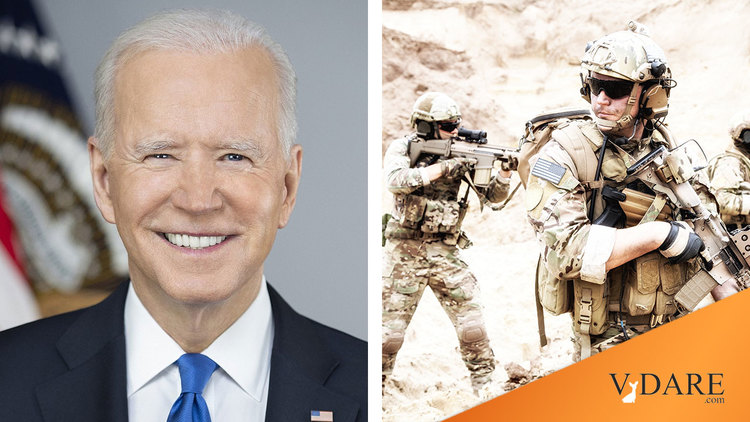
Patrick J. Buchanan: Biden Bids Farewell To A “Forever War”
04/15/2021
Earlier by Patrick J. Buchanan: Are the Forever Wars Really Ending? and What Does Winning Mean in a Forever War?
"It is time to end the forever war."
So said President Joe Biden in his announcement that, as of September 11, the 20th anniversary of the attacks on the World Trade Center and Pentagon, all U.S. troops will be gone from Afghanistan.
The longest war in our history, which cost 2,400 dead, 20,000 wounded and $2 trillion, is ending — but only for Americans, not Afghans.
Secretary of State Antony Blinken assured our NATO allies in Brussels that we are all leaving with our mission accomplished:
"Together we went into Afghanistan to deal with those who attacked us and to make sure that Afghanistan would not again become a haven for terrorists who might attack any of us.
"We have achieved the goals we set out to achieve," the secretary said. "Now it’s time to bring our forces home."
But while the U.S. military did not lose a major battle, we Americans did not win this war. Our enemies are stronger, and they control more territory today than they have since their overthrow in 2001.
They have reconstituted themselves under fire, control half of the country and can cut roads to the capital of Kabul. And in our mission to build a democratic Afghanistan that could sustain itself long after we depart, we failed.
And we have no guarantee al-Qaida will not reestablish itself in Afghanistan. For the most probable successors to the regime we are leaving behind are the same Taliban we drove from power in 2001.
And while the Taliban did not defeat us, they have bled the Afghan army we helped to create and train, and outlasted the United States and a NATO alliance that emerged victorious from a 40-year cold war with the Soviet Empire.
As we depart Afghanistan before summer’s end, the 7,500 NATO troops there will be leaving with us. That this is viewed as no strategic victory may be seen from the reaction of those who most consistently supported the war, conservative Republican senators.
Said Majority Leader Mitch McConnell of Biden’s announcement:
"Precipitously withdrawing U.S. forces from Afghanistan is a grave mistake. … Foreign terrorists will not leave the United States alone simply because our politicians have grown tired of taking the fight to them."
Said Lindsey Graham:
"It is insane to withdraw at this time given the conditions that exist on the ground in Afghanistan. … A full withdrawal from Afghanistan is dumber than dirt and devilishly dangerous … President Biden will have, in essence, canceled an insurance policy against another 9/11."
Said the ranking Republican on armed services, Jim Inhofe:
"No one wants a forever war, but … any withdrawal must be conditions-based. Arbitrary deadlines would likely put our troops in danger, jeopardize all the progress we've made … lead to civil war in Afghanistan — and create a breeding ground for international terrorists."
But if we failed in Afghanistan, why did we fail?
Our enemies, the Taliban, motivated by a religious faith many would call fanaticism, were more willing to sacrifice, suffer, fight, bleed and die for longer than we or our Afghan allies.
The Taliban are Eric Hoffer’s "True Believers."
Also, it is their country, after all, not ours. It is everything to them, not so much to us. They are steeped in the traditional Afghan hostility to foreigners and hatred of those who come to their land to tell them how they should live and rule themselves.
The Taliban captured the flags of anti-colonialism, nationalism and Islamic fundamentalism.
There is talk that, should the Taliban topple the government, bring down the regime and engage in reprisals and atrocities, American troops might surge back in.
My sense is no. When we go this time, we're gone for good. Like the Brits in the 19th century and Russians in the 20th, when we go, we will not return.
Yet, Afghanistan is only one of the "forever wars" into which our interventionists plunged us that have proven so ruinous to the republic.
The greatest blunder came in 2003, when George W. Bush was persuaded by the neoconservatives to invade Iraq and covert that country into America’s model democracy for the Middle East.
Our 18-year struggle in Iraq following the invasion of 2003 has proven even most costly in lives and treasure than the war in Afghanistan.
After Iraq came the intervention in Syria’s civil war to back rebels seeking to oust President Bashar Assad. After that came the U.S.-NATO intervention in the Libyan civil war and America’s intervention on the side of Saudi Arabia in Yemen’s civil war.
For a generation now, we have been stomping barefoot on anthills and throwing rocks into bees' nests across the Middle and Near East.
And to what avail?
The nation-builders, the democratists, the liberal interventionists, the New World Order crowd are, today, being repudiated by Biden’s decision to write off their 20-year project in the Hindu Kush.
One wonders: will they soon start calling Biden an isolationist?

COPYRIGHT 2020 CREATORS.COM
Patrick J. Buchanan needs no introduction to VDARE.com readers; his books State of Emergency: The Third World Invasion and Conquest of America, and Suicide of a Superpower: Will America Survive to 2025? are available from Amazon.com. Patrick J. Buchanan is the author of “The Greatest Comeback: How Richard Nixon Rose From Defeat to Create the New Majority.
His latest book, published May, 2018, is “Nixon’s White House Wars: The Battles That Made and Broke a President and Divided America Forever.”
See Peter Brimelow’s review: “Wheel And Fight” — Pat Buchanan’s Nixon Book Provides Road Map For Trump.
